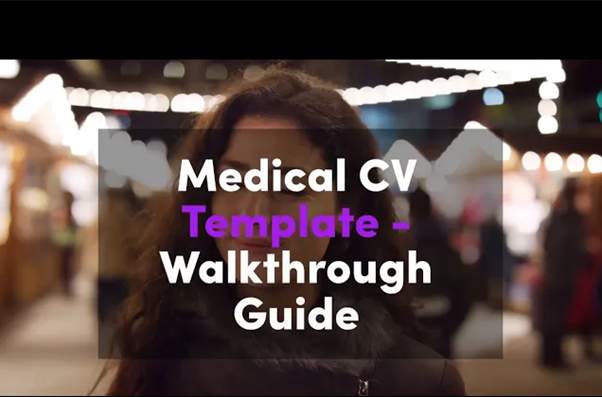
Top Tips on How to Write a Medical CV
11 Dec, 202310 Minutes
A well-structured medical CV is vital in your journey for your dream NHS role. It allows you to clearly and succinctly present your academic, clinical, and personal accomplishments, setting you apart from other candidates.
For an international medical graduate (IMG), crafting a medical CV that meets the requirements of the NHS might seem daunting. However, we're here to address your burning questions and offer practical advice about how to write a medical CV.
Our detailed guide provides valuable insights into the importance, structure, and essential do's and don'ts of an effective medical CV and ensures you are fully prepared to be confident going into your job search journey.
The Importance of a Good Medical CV
Your medical CV plays a crucial role in your professional journey and career advancement. It serves as a vital tool that provides insight into your qualifications, experience, and successes, making it indispensable for your medical career.
Your medical CV is often the first point of contact between you and potential employers. It serves as a professional introduction to help you make a lasting impression that can significantly boost your prospects of landing your dream job. A well-written and structured medical CV shows your dedication and passion for the field and demonstrates your commitment to a career within the NHS.
How Should You Structure a Medical CV?
Due to its importance in your job search journey, a medical CV should have an organised structure for readability and presentation. This will ensure it looks professional, is readable, and includes all the information required by an NHS employer.
Here is the format we recommend for your medical CV:
Personal Information
This section should include:
- Full name
- The NHS position you are applying for
- Current address
- Email address
- Telephone address

Professional Summary
- GMC registration
- PLAB or postgraduate qualification
- IELTS or OET results
- International qualifications
- Primary medical qualification (or MBBS)

Career Summary and Objectives
This section should contain two concise paragraphs detailing your employment history and career goals. The first paragraph should include:
- Where you are currently employed
- Your position
- Your grade
- How long you have worked there
- Previous employment, including dates and positions
The second paragraph is vitally important as it is an opportunity to really sell yourself, your qualifications, and your motivations for working for the NHS. This might include specific career goals.

Competencies, Procedures, and Clinical Skills
Here, you should clearly demonstrate the specific clinical skills you have gained during your experiences. This section is particularly vital for international medical graduates, as NHS employers must understand the differences and similarities between your training, qualifications, and experience you have acquired in your home country and the work you’ll be potentially doing in the UK.
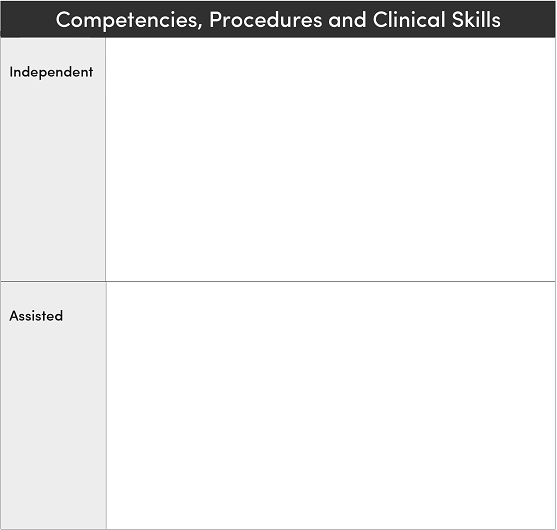
Current Employment
Here, you will provide details about your current employer. Here are the key details you need to include:
- Job title
- Employment dates
- Duties and responsibilities
- Type of hospital you work at
- Your department
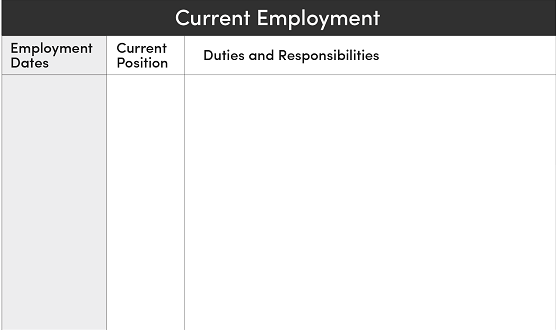
Employment History
In this next section, address your previous work experience. This should mirror the format used for your 'current employment.' Remember to present your work history in reverse chronological order, with your most recent job listed at the top. Consequently, you will likely conclude with your foundation training or internship.
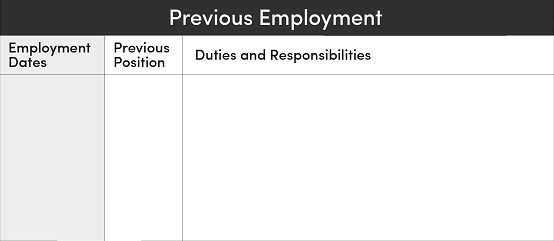
Training Courses and Conference
Include any training courses, professional development activities, conferences, or speaking engagements you have completed, attended, or conducted on your medical CV. Organise them in reverse chronological order for clarity.
Research and Publications
If you have contributed to any research or publications during your medical career, list it here in reverse chronological order. If you have a publication/piece of research you’d like to highlight more, do so by simply going into more detail about it.
Awards and Accreditations
If you have won any awards or accreditations during your medical career, then list them here. You will need to include details such as who granted it, the reason it was given, and the date you were awarded.
Extra Information
This section can include any extra information you feel will benefit your applications. Here, you can talk about your activities, interests, and hobbies outside of work to add a touch of personality to your application.
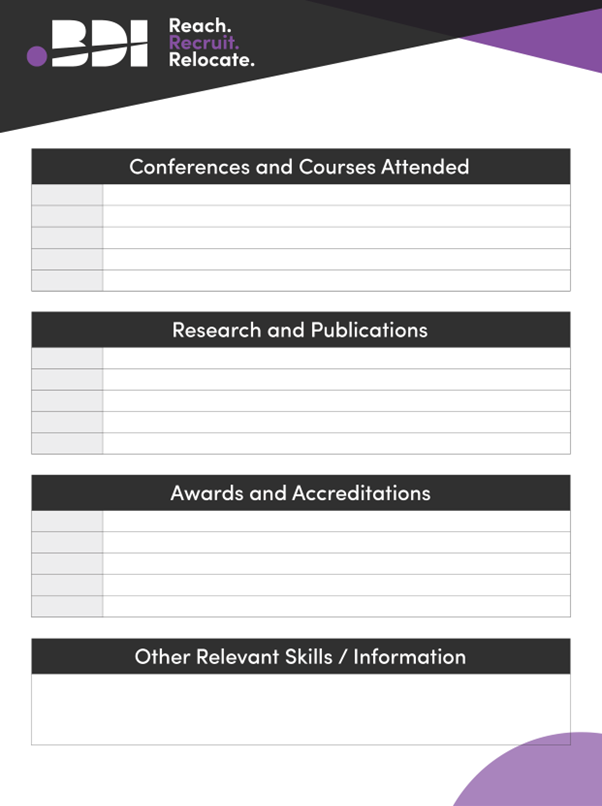
References
You need to provide three references that cover three years of work history. These references should be supplied by a clinician who is more senior than you.
You need to provide the following:
- Referees' names
- Titles
- Departments
- Contact information
If you would like more information about structuring an effective medical, then discover our insightful guide, How to Structure an Effective Medical CV. You can also watch the video below, which explains each of the above sections in full detail:
If you’re unsure on CV structure then you can download our template CV or this video explains each of the above sections in full detail:
How Long Should a Medical CV Be?
Generally, a medical CV could be around ten pages long. However, the length will be influenced by your experience. For example, it will be longer for doctors who have been working in specific specialities for several years and shorter for junior doctors just starting their careers.
Try not to worry too much about the length; just focus on ensuring you are putting in the required information that we set out in the how-to structure a medical CV section above. The employers are looking for details on your skills, qualifications, and experience, and how these will make you successful in the role, rather than how many pages your CV is.
How to Explain International Experience on Medical CVs?
Whilst UK-based doctors who have completed FY1, FY2, CT1, CT2, ST training, etc, will have an assumed level of competency, international doctors need to show NHS employers that their international experience, including their qualifications and clinical work, is good enough for the specific role. That means being detailed and precise when listing your experience and general responsibilities.
As well as displaying your qualifications and experience, you should also go into your specific clinical skills under the section ’competencies, procedures, and clinical skills’.
This section allows you to talk in detail about your medical skills. Include everything, from junior medical knowledge to the more specialised skills you’ve picked up over the years. Doing this demonstrates exactly what your experience/training has provided, which helps tell the NHS employer if you are a good fit for the post.
It also highlights any skills gaps you may have. However, this is not a reason to panic. If you do have any skills gaps, the employer just knows where they need to provide training. So be completely honest about your experience; it will help you in the long run.
What Font is Best for a Medical CV?
First, do not experiment with fonts, sizes, and colours. Keep the font the same size throughout, with the only exception being to display your headings one size bigger.
We recommend using professional yet simple fonts such as Calibri, Serif, Ariel, or Times New Roman.
How Do You Explain Career Gaps on your Medical CV?
Addressing career gaps is essential. You’ll be asked about them at some point anyway, so explaining them in your CV helps clear it up early on. It’s always a good idea to demonstrate how you stayed in tune with the medical field during your career break. For example, you could talk about a training course you took or the types of medical articles you read.
Be honest about what you did during your career gap. State the correct dates, too. Remember that if you get invited to an interview, you’ll likely be asked about them, so it’s important to be honest and prepare for that.
Also, don’t worry – career gaps shouldn’t affect your chances of securing a role, especially if you have the qualifications/experience necessary and you are able to explain them fully.
Differences Between UK Medical CVs and International CVs
Understanding the difference between a UK medical CV and one you might write in your home country is essential. Of course, the differences will depend on your home country, but you should know some general things.
The UK workplace has a real focus on diversity inclusion, which means UK medical CVs should never include the following information:
- Family information
- Religious background
- Age
- A photograph
Also, displaying social media accounts on a UK medical CV is not common practice, so this is not necessary.
Another thing a UK CV doesn’t ask for is every single grade you got in school or college. For early education, a general overview of your qualifications is enough. For example, 10 GCSE’S Grade A-C.
Writing a Medical CV: Summary of Dos and Don’ts
To make sure you get your medical CV right, here is our list of dos and don’ts:
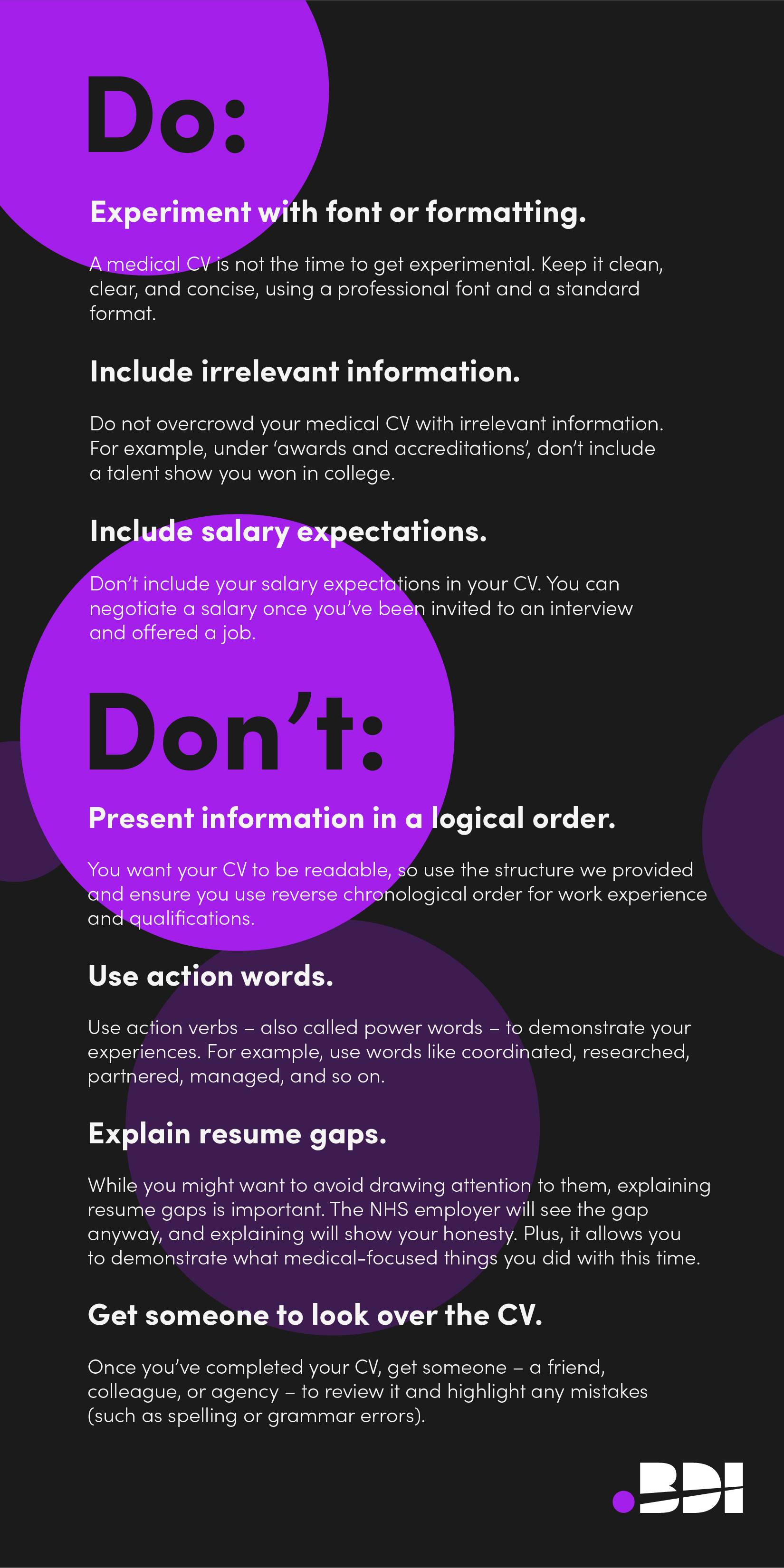
If you would like to download our helpful medical CV template, which has proven to be successful with thousands of applications, fill in the form below.
Final Word on How to Write a Medical CV
Your medical CV is your initial point of contact with prospective employers, allowing you to make a lasting impression and enhance your chances of securing your desired position. A well-structured and well-written medical CV not only reflects your dedication and commitment to the field but also provides a comprehensive overview of your qualifications and experiences.
Adhering to our dos and don'ts, presenting information logically, explaining resume gaps, and understanding the differences in UK and international CVs are all key to crafting a successful medical CV. When created thoughtfully and professionally, your medical CV will significantly contribute to your career success and increase your chances of landing your dream NHS job.
Specialists in Shaping NHS Careers
After you've created your impactful medical CV following our expert guidance, you'll be well-prepared to embark on your job search. Our dedicated team is here and eager to offer you personalised and expert support. Our mission is to make your transition to practice as a doctor in the UK as smooth as possible.
Many doctors from various corners of the globe have placed their trust in us, benefiting greatly from our services. Are you prepared for us to be your trusted recruitment partner? Get in touch with our team today, and let's elevate your job search journey to new heights.

